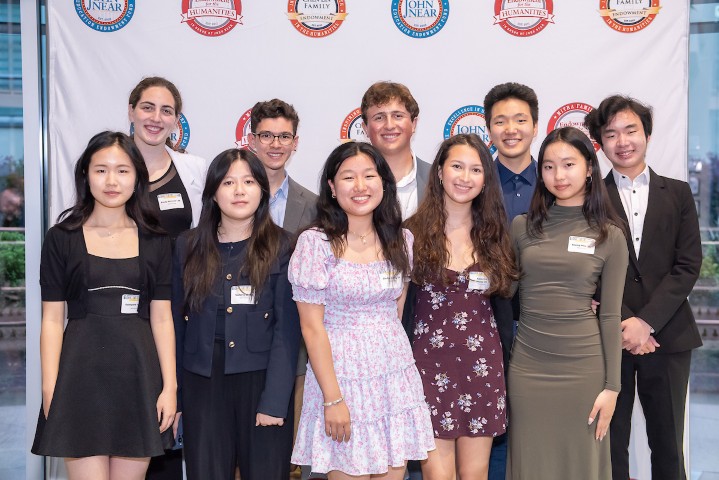Last week, families and friends of this year’s Near-Mitra Scholars – Near Scholars Felix Chen, Anwen Hao, Gabe Sachse and Jason Shim; and Mitra Scholars Mu Jia Jiang, Valerie Li, Katerina Matta, Young Min, Emily Mitnick and Sahngwie Yim, all seniors – gathered at Nichols Auditorium for this year’s Annual Recognition Event for student scholars participating in the John Near and Mitra Family Scholar Grant Program. Each of this year’s scholars gave brief summaries of their research, recognizing the faculty who mentored them throughout the rigorous process, who are supported by the Chen Lin Family Endowment.
Felix Chen’s paper covered the role access to public libraries played in shaping public sentiment of the civil rights movement. “I sought to understand how libraries reflected their immediate communities in regard to service and access, and how the conflict between the democratic ideals of librarianship and the restrictive aims of segregation came to a head,” he said.
In “Evolution over Revolution,” Anwen Hao investigated one example how the rule of law has managed to endure in the American judicial system, focusing on President Franklin D. Roosevelt’s plan to fill the Supreme Court with sympathetic justices and how his plan was resisted by Congress and the press.
Gabe Sachse examined the work of two highly influential film directors, John Ford and Sergio Leone, and how both shaped the western genre as well as popular views of American culture. “I felt that in the intersections between art and society, I could build some larger truths about how America viewed itself,” Sachse said.
Korean politician and reformist Yun Chi-ho was the subject of Jason Shim’s research, which examined Yun’s time in the United States attending Emory University and Vanderbilt University, as well as his ideological similarities to Booker T. Washington. “I think it is incredibly valuable that I got to experience something so self-driven,” Shim said.
View this post on Instagram
For her project, Mu Jia Jiang surveyed the work of German artist Käthe Kollwitz and how her life experiences led her to explore themes of loss and grief in her work. Her research also led her to travel to New York City to see Kollwitz’s work up-close at the Museum of Modern Art.
Valerie Li investigated the role Japanese media played in justifying the massacre of the Chinese city of Nanjing by the Japanese Imperial Army during World War II. Although initially hesitant to cover the topic, she wanted to “explore why it happened, why it wasn’t prevented and why crimes of such scale could be justified.”
Inspired by the work of Chicana feminist scholar Gloria Anzaldua, Katerina Matta explored the history and strategies of the Chicana feminist movement, starting with the beginnings of the broader Chicano movements among Mexican-Americans. “Her work really spoke to me as someone who is also multiracial or multicultural and has lived through a lot of the same questions of what happens when cultures conflict.”
In her research, Young Min studied the values of traditional Korean medicine and how they informed the establishment South Korea’s current healthcare system, starting with the reign of King Sejong in the 15th century. The project, she said, “has constantly, constantly reminded me about what should motivate us to advance our national healthcare system.”
Emily Mitnick’s reading about the story of a Hmong refugee-turned-professional poker player inspired her to delve into the broader story about Hmong-Americans. Reflecting on her research, Mitnick said, “I think the Hmong we’re able to find their place in America because they refused to sacrifice who they were. They didn’t want to just blend in.”
Finally, Sahngwie Yim studied the historical context for the declining population and low fertility rate in South Korea, specifically the country’s family planning program, which ended in the 1990s but whose effects are reverberate into the present day. While the program led to major economic and social gains, “its implementation was also often coercive and dangerous,” Yim said.
Following the presentations, a symbolic Passing the Torch Ceremony was held to honor next year’s scholars, all currently juniors: John Near scholars Natalie Barth, Farhan Ansari, Sofia Shah, Ananya Pradhan and Yena Yu; and Mitra scholars Linda Zeng, Joy Hu, Anoushka Chakravarty, Roshan Amurthur and Ariel Zhang.
